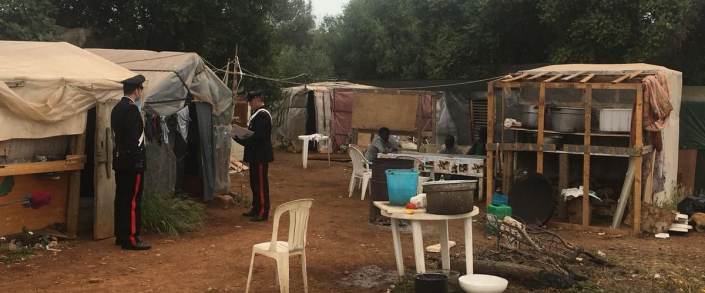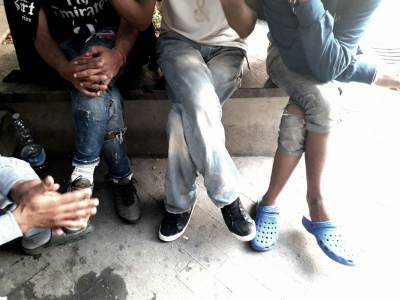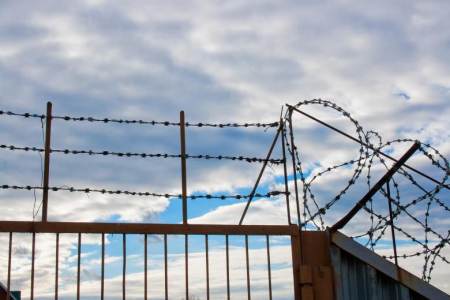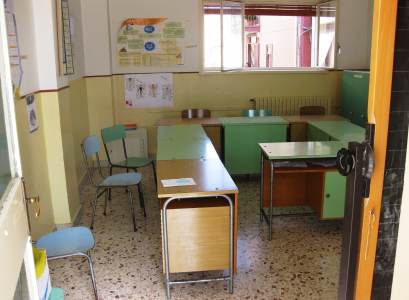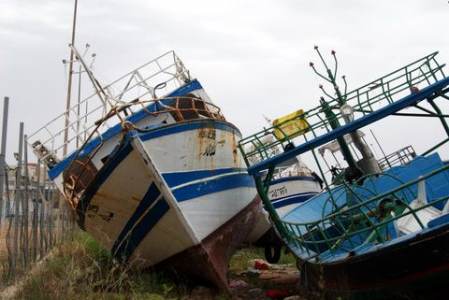The Shanty Town at Cassibile at the Point of Emergency: “Employers Should Guarantee Accomodation”
From MeridioNews.it – CRONACA – Seventy-nine African men camped out in more than 50 shacks on private land. Without water nor electricity and in appalling hygenic and sanitary conditions. All of this has been reported to the public prosecutor but finding an alternative living situation for them is not easy. “We are trying to work together” says the Syracusa local council.
The situation has been under everyone’s noses for years. But only now are they waking up to it. More than 50 shacks made out of woods and sheets, without running water nor electricity, and in appalling hygenic conditions. An illegal settlement on private propertly, stretching around 1km squared, in the area of Stradicò, near to the ward of Cassibile, Syracuse.
When the carabinieri inspected the area, there were 79 non-EU citizens in the area, capable of hoting more than 120 people. The majority of the reidents are originally from Africa, all of them are adult men and with regular leave to remain in Italy. This is nothing new: it is the usual migrant ’emergency’ that emerges every year in the same period, in one of the areas of Syracusa most characterised by illegal group hiring (“caporalato”). After the police’s discovery of the area and the inspection (along with the council aide for Environmental Policy), the shanty town has remained where it was. And no solution appears to be forthcoming.
“We’re working on a plan for intervention aimed at definitively cleaning up the area”, the aide for Social and Housing Policy for the Syracusa local council, Giovanni Sallicano, told MeridioNews. “But this means asking for funding that will allow us to find adequate solutions. At the moment, the funding is scarce.” Thus this has been the only housing solution for many years for the seasonal migrant labourers who take on a large part of the harvest in the nearby farms. The problem involves the local council, the Prefecture, various police bodies, the local health authority, the inspector of labour and yet the situation remains static. “The issue is made even more complicated because a solution needs to be found in accordance with all the relevant bodies”, the council aide explains. “The working idea we are evaluating – which has to be taken forwards even without financing from council bodies – is the idea of involving structures from the third sector and organisations such as Caritas.”
The seasonal labourers, the majority of whom come from Sudan, begin to arrive in March in order to work in the vegetable farms around Cassibile. “They spend at least a couple of months in the favelas, which are set up within abandoned farm houses or made out of tents constructed with materials that they find and reuse. But without electricity, water or sanitary services.” This is the account of Carlo D’Antoni, a priest in the parish of Boscono Minniti in Syracusa. For years he has become a point of reference for both Italians and foreigners im difficulty, hosted in the parish buildings.
In the area where the community spends its time, the migrants have also constructed communal buildings: a kind of improvised cafe with a bar, a television and a few plastic tables where to serve food and drinks. Between the tents, sheets, bits of plywood and laundry, there is even an area set aside for prayer. In the same site, there is also an open-air rubbish dump where the occupant’s rubbish is burnt. All of this has been reported to the public prosecutor of Syracusa as ‘invasion of private land’ but, as the police conferm, for now they will continue to live in the area in the same conditions. “We are working together to resolve the situation, even if only temporarily” says the council aide for Environmental Policy, Pietro Coppa, “while awaiting a definitive solution for these migrants who, even if not year permanently, are nevertheless not nomadic. They are workers, and as such ought to have bed and board guaranteed by those who are employing them in the fields.”
Even in theory however, imagining an alternative for them does not seem an easy task.
Marta Silvestre
MeridioNews
Project “OpenEurope” – Oxfam Italia, Diaconia Valdese, Borderline Sicilia Onlus
Translation by Richard Braude

